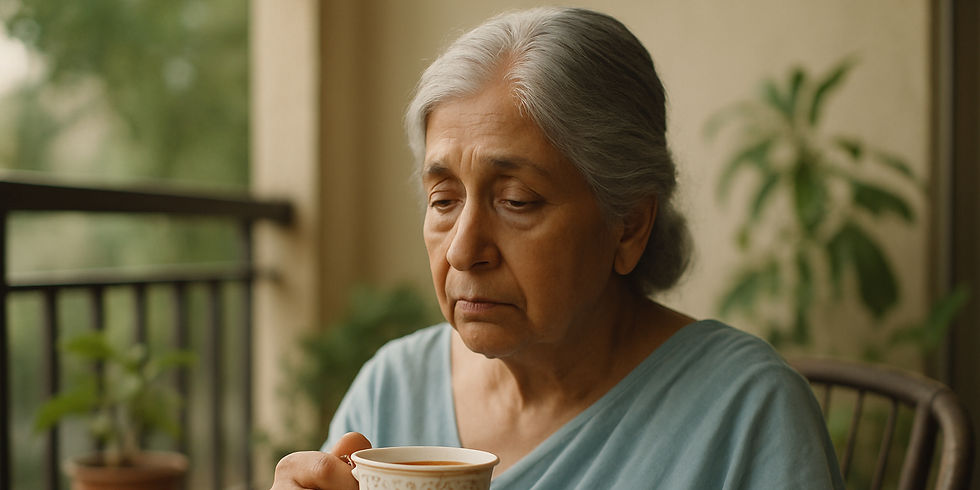Checking in on Aging Parents: What to Look For During Holiday Visits
- saqlainm5
- May 5, 2025
- 3 min read
The holidays are often a special time for reconnecting with family, whether through in-person visits or virtual calls. For adult children, these moments can also become important opportunities to observe how aging parents or grandparents are truly doing, especially when day-to-day check-ins aren’t possible.
At Home and Community Care Ltd. (HCCL), we understand the challenges many families face when trying to balance concern with respect for independence. Whether you’re seeing your loved ones in person or over a video call, here are ways to gently assess their well-being, and determine whether extra help may be needed.
When Worry Sets In
Many adult children wonder:
“Mom sounds fine on the phone, but avoids video calls. Should I be concerned?”
“My dad’s neighbor checks in occasionally, but are they noticing gradual changes?”
“My parents are isolating more since the pandemic began. Could this affect their mental health?”
“Grandma missed our Zoom call again and brushes it off. Is it just forgetfulness?”
These concerns are valid. Age-related changes can be subtle and slow to appear, but if you know what to look for, you can spot signs that suggest additional care might be needed.
What You Can Observe During a Visit (Virtual or In-Person)
🧓 Personal Appearance
Are they noticeably thinner or heavier?
Do they appear less groomed or more disheveled than usual?
Are they wearing mismatched, stained, or unkempt clothing?
These may be signs they’re struggling with self-care routines they once managed independently.
🏠 Household Condition
If you’re on a video call, you can gently ask your parent to show you the kitchen or living room:
Are surfaces cluttered or dusty?
Are dishes piling up or mail left unopened?
Has the cleanliness of the home changed compared to how they used to keep it?
Changes in household habits can signal cognitive, physical, or emotional decline.
🚶♀️ Mobility and Strength
Encourage them to show you something they love, a photo or gift. Watch how they move:
Do they struggle to get up or seem unsteady?
Are they using (or forgetting to use) mobility aids like canes or walkers?
Are they short of breath after minimal movement?
Decreased physical activity can lead to muscle loss, making falls more likely.
💬 Memory and Mental Health
Casual conversation can be revealing:
Do they repeat themselves or forget recent topics?
Are they confused about dates or current events?
Have they become more withdrawn or emotionally flat?
Ask directly (with kindness) if they’ve been feeling low or lonely. Isolation, especially post-COVID, has taken a toll on older adults' emotional and cognitive health.
How to Follow Up If You Have Concerns
It’s important to approach any concerns with compassion and partnership:
Share what you’ve noticed, and ask if they’ve felt the same.
Position yourself as an ally: “I want to help you stay as independent and well as possible.”
Suggest small supports like housekeeping help, meal delivery, or a caregiver for companionship.
If your concern is health-related, consider arranging a virtual doctor’s appointment and asking to attend. Having a medical professional involved can often ease resistance.
🟣 HCCL also offers medical consultancy and home assessments, a valuable first step if your parent is unsure about receiving outside help.
If They Say “No”, Be Patient
It’s not always about stubbornness. Sometimes the idea of needing help is frightening or overwhelming. If they’re not ready to accept support, that’s okay. You’ve opened the door. Keep the conversation going with empathy and patience.
Host a Family Meeting
Involving siblings or close relatives in a virtual family meeting can help:
Share observations and concerns collectively.
Review a checklist of safety and wellness points before the call.
Work together to plan next steps, with everyone on the same page.
Open dialogue makes future decisions smoother and more supportive for everyone involved.
HCCL Is Here to Help
At HCCL, we specialize in providing personalized in-home care that respects dignity, supports independence, and eases the burden on families, whether your loved ones live near or far.
From trained caregivers and nurse consultations to household assistance and companionship, we are ready to step in with care that feels like family.






Comments